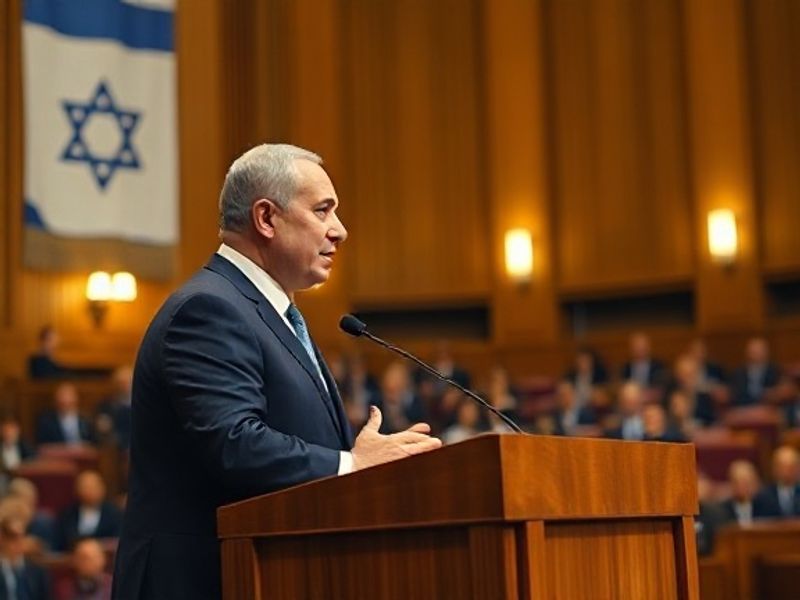Netanyahu’s Global Turbulence: Why One Man’s Storm Cell Keeps the World Buckled In
Netanyahu at the Helm: A Global Weather Report from the Eye of the Hurricane
By the time most world capitals finish their second espresso, Benjamin Netanyahu has already rewritten the day’s geopolitical forecast. To his fans, he is the indispensable air-traffic controller of Middle Eastern turbulence; to his critics, a one-man low-pressure system that refuses to drift out to sea. Either way, the planet keeps circling his storm cell, adjusting altitudes, re-routing alliances, and praying the seat-belt sign isn’t permanent.
From Brussels to Beijing, leaders treat the Israeli premier less like a national politician and more like a regional thermostat. When he turns up the heat on Iran’s nuclear ambitions, oil futures in Singapore shiver. When he quietly courts the Saudis over a clandestine Riyadh brunch, European diplomats suddenly remember they have “urgent” desert allergies. And when he appears in a Manhattan courtroom—simultaneously prime minister and defendant—the UN Security Council wonders whether international law is a sturdy firewall or just decorative bunting.
Europe, ever the exasperated older sibling, oscillates between scolding Netanyahu for settlement expansion and begging him to keep the gas flowing. Germany, still atoning for last century’s hobby of genocide, ships submarines as apology-cum-investment-vehicle; France offers stern communiqués and discreet weapons upgrades. Britain tries the classic imperial trick of praising Israeli innovation while refusing to label West Bank produce. The continent’s message is schizophrenic but consistent: “We disapprove, please continue.”
Across the Atlantic, Washington’s relationship with Bibi resembles a long-running telenovela produced by Lockheed Martin. One season he is lecturing Congress behind the president’s back; the next, he is receiving bipartisan standing ovations for the exact same speech. American administrations change, yet the defense appropriations remain the ultimate prenup. Biden may grumble about “democratic norms,” but Iron Dome interceptors still arrive by FedEx, signed for with a polite bipartisan smile. The American voter, distracted by domestic reruns, mostly notices Israel only when rockets light up the evening news—then promptly forgets until the next commercial break.
Meanwhile, the Global South watches with the weary amusement of tenants whose landlord keeps renovating the penthouse while the plumbing leaks downstairs. Brazil wonders why its Amazon deforestation earns sanctions while certain hilltop outposts get rebranded as “neighborhoods.” India, balancing Israeli drones and Iranian oil, simply adjusts its moral compass to magnetic north: profit. African states, courted by both Israeli irrigation tech and Arab petrodollars, practice the ancient art of smiling twice in one handshake.
Netanyahu’s genius—if one can call chronic survival a form of genius—lies in converting local chaos into diplomatic leverage. Every indictment at home becomes evidence of a vast left-wing conspiracy abroad; every security flare-up resets the international conversation to his preferred frequency. He has weaponized entropy itself, turning the Second Law of Thermodynamics into a campaign slogan: “Vote for me, or the universe gets even messier.”
For global markets, the Bibi premium is now a line item. Insurance underwriters in London quietly price in “West Bank volatility.” Tech investors in Tel Aviv hedge against “judicial overhaul risk,” a euphemism for constitutional arson. Even cryptocurrency bros—those stalwart believers in stateless utopia—find their portfolios twitching when Iron Dome batteries reload. Nothing says “digital gold” quite like the faint whistle of a Tamir interceptor overhead.
And yet, beneath the cynicism lies a grudging truth: Netanyahu is not merely surviving; he is exporting the drama. The world’s diplomats may roll their eyes, but they keep his number on speed dial, like a divorce lawyer everyone claims to despise yet secretly relies upon. International summits still seat him near the center, partly because protocol demands it, partly because no one trusts the weather report without checking the storm chaser himself.
So here we are, circling the same cumulonimbus for decades, adjusting our tray tables as the captain toggles the Fasten Seat Belt sign on and off. Netanyahu, ever the seasoned pilot, radios the tower with calm confidence: slight turbulence ahead, nothing the aircraft can’t handle. The rest of us peer out the window, watching settlements and indictments drift past like cloud formations, wondering whether we will land safely, parachute into unknown territory, or simply circle forever, hostages to the jet stream of one man’s prolonged prime ministership.







